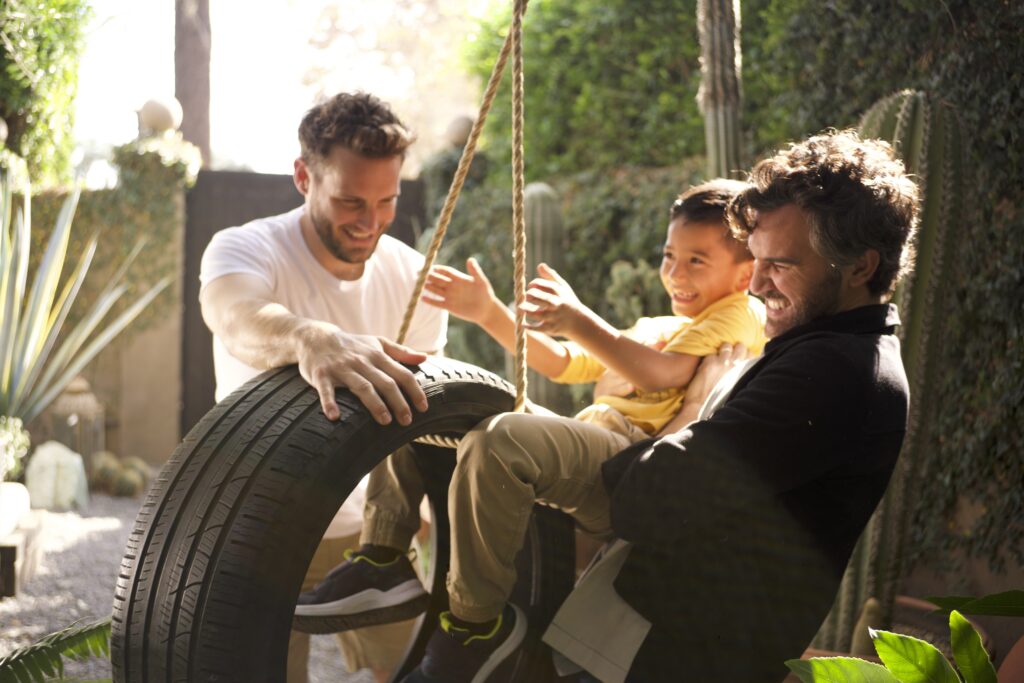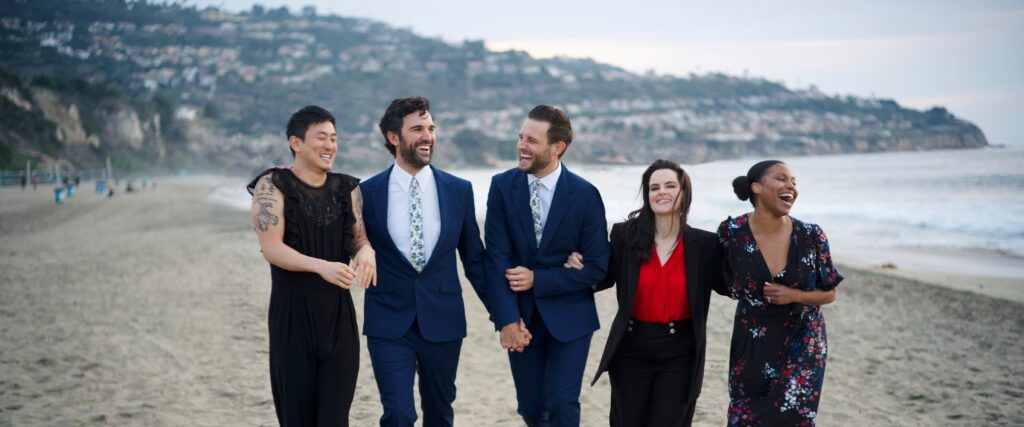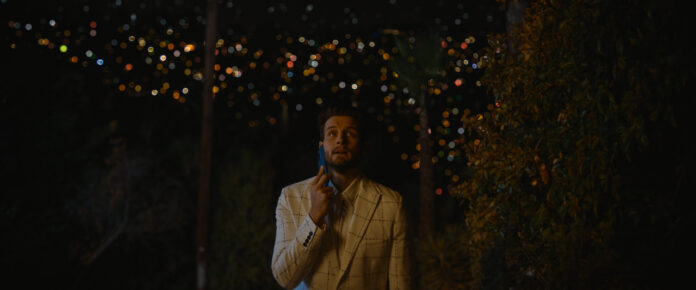“The Mattachine Family,” now available on digital platforms, is a feel-good comedy-drama about gay photographer Thomas (Nico Tortorella) choosing the family he wants. It goes beyond having married his husband, Oscar (Juan Pablo Di Pace), or having supportive friends — Leah (Emily Hampshire), her partner Sonia (Cloie Wyatt Taylor), and Jamie (Jake Choi); it’s about having a child. After Thomas and Oscar foster Arthur (Matthew Jacob Ocampo) for a year, Thomas is bereft when Arthur is returned to his birth mother. While Oscar, a former child actor, takes a job in Michigan, Thomas mopes around L.A. trying to find purpose in his life. He is wary about being a dad again, but he also wants to fill the void Arthur created.
This warm film, directed by Andy Vallentine and written by his husband Danny Vallentine (based on their experiences), deftly examines gay parenthood from various angles, including surrogacy and fertility clinics. The film’s bittersweet nature — as Thomas’ poignant voiceovers and photographs consider what family and friends mean — will melt the hearts of sentimental viewers.
The nonbinary Tortorella spoke with Philadelphia Gay News about making the film and being a parent.
“The Mattachine Family” addresses identity politics — coming out, being gay, as well as the politics of being a gay husband and a father. Can you talk about what being queer means to both you and your character, Thomas?
This movie came across my desk at a time when my partner and I were trying to get pregnant, and we were dealing with infertility for just about a year when I got this script. The ways my wife and I were going about trying to create life may, on paper, seem traditional, but given our relationship and who we are, it was very queer to us. We understand not everyone would see it that way. Getting this script at that time was one of those “art imitating life” moments. So much of myself and my current experiences were in this script. There’s a line, “What does it mean to be a gay parent?” and I posed that question to the Vallentines, as they were dealing with their own fertility [issues] and their own journey [to parenthood]. We had this conversation about creating life at a time when life seemed most fragile. Our experiences were more similar than different. For both myself and Thomas, we are dealing with the unconventional and the nontraditional. Every parent has a different journey bringing a child into the world, whether they are straight, gay, or anything in between. I was excited to bring a piece of myself to the story and to better understand what it meant to be a gay father through Thomas.
What can you reveal about your experiences parenting and how they informed your portrayal?
There were many ways this film was a boot camp to becoming a parent. We had lots of trial and error and complications and IVF. But I got to experience parenthood through Thomas in a way that was life changing. He put so much of himself into this idea of becoming a parent. There was no alternative. This is who he was, and he was going to do whatever it took to get there.
At home, I was the rock in the relationship and not able to [personally] experience the emotional trajectory of infertility. When I came on set, I was able to feel everything that I was closeting as a soon-to-be parent in my own house. Because I had to hold down the foundation a different way. Becoming a parent changes everything in regards to who you are. There is no knowing how massive a transformation you are about to experience is unless you experience it. I am a completely different person from who I was before my daughter was born. I have another child coming in October. It’s going to change me again. It is the best thing I have ever done and hardest at the same time.
Thomas has very supportive friends in Leah, Sonia and Jamie. What can you say about the queer community creating a chosen family, which is what Thomas desires with his friends and baby.
It’s one of the most important aspects of life in general — queer and straight. It’s being able to find community. In conversations with queer people, we talk about us alone, but I have plenty of straight friends that don’t have the best relationship with their family and find community in their friendships. It’s different for us, but through Thomas, and in his struggle to find his own family, he leans on the ones who are closest to him to find support, and that is something any queer person can wrap their head around.

Your performance involves comedic moments, dramatic ones, and romantic scenes. What can you say about finding Thomas’s character and playing all his emotions? Your performance is very empathetic and impactful.
We shot this in 20 days and I’m in pretty much every single frame going from super intense emotional scenes with Juan Pablo to the funnier scenes. It was “emotional Olympics.” It was the first time I led a project like this, and it’s a dream as an actor to challenge myself in these ways. But as I said, there is so much of myself in this story I was able to channel the majority of it.
Do you think Thomas is selfish? He is doing so much for the child he wants.
It doesn’t go without saying Oscar is also acting selfishly, putting his career first and spending time away from Thomas. People can grow apart. Their wishes, dreams, and desires can bend and shift. What I learned in my own relationship, is if you can perfect the bend so you don’t have to break, you can get through whatever comes your way.
Thomas is stuck. How do you think he copes with his feelings of despair and longing? He seems to spiral rather than self-care.
That’s what life is. You have to take care of yourself first. Is becoming a parent the most selfish act or most selfless act? I deal with that all the time. I have another person in my house who takes priority over everything in my life now. Everything in my life is second to her. Plenty of my friends are not parents, and will never be parents, but I always knew, even since I was a little kid, that I would be a parent one day. There was absolutely no question.
The film emphasizes we have one life, and we should make it wild and precious. We see how Thomas does that. How do you do that?
I think it’s about being the most present every day. I dream big and put myself in situations and universes that are foreign and challenging. I try to approach everything I do with a sense of curiosity and wonder and openness. At the end of the day, we are on a rock flying through space at ridiculous speeds. We don’t really have any idea why we are here. If I can remind myself on that at a regular basis, it allows me to sit in myself where I am right now and not take everything too seriously. That is a privilege, I understand that, but life is a privilege.

